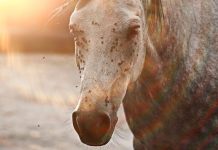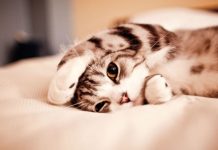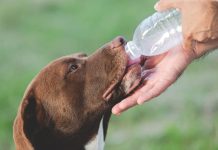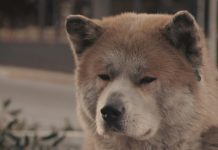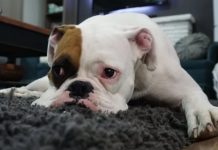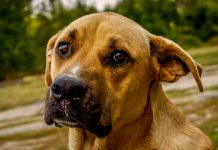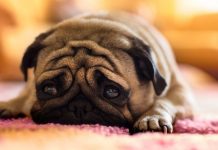The Bichon Frize is an amazingly affectionate little dog that was simply born to be a faithful companion to humans. This pet is a born artist. Previously, this breed could often be found in the circus, but today the dog entertains people at home more often than in the circus arena, although it can also be found in the arena, and not so rarely!
Adorable cotton-like curls have made this affectionate, gentle dog insanely popular. The Bichon Frize loves to be in the spotlight, which is not surprising given that these dogs used to be real stars and performed amazing tricks in the circus, which delighted the audience. Her dark eyes are filled with sparks of enthusiasm and fun. The dog is not picky, for happiness it does not need much: a soft bed and a little food from your table! But do not flatter yourself. Bichon is not born “ideal”, he is not a clockwork toy, and therefore education and training should take an important place in the life of a dog.
Just because Bichons are smart and artistic does not mean that they don’t need to be trained and trained. You should not indulge the dog in everything. Discipline must come first! At the same time, do not go too far in discipline, otherwise, instead of an artistic dog, you can get a glamorous tyrant! If you want your dog to only delight you with his mischief and fun, pay due attention to training!
Although the Bichon Frize is recognized as an ideal domestic dog, it is not recommended to keep this breed in families with small children, or active teenagers. The fact is that Bichon can injure a child while playing, naturally, this can not happen arbitrarily, but this will not make the child any easier. Bichons often frighten children with their unexpected barking. They say that this breed is hypoallergenic, but this is a lie. Scales of the skin of a dog, which are in the coat, like in other breeds, can cause allergic reactions. And dandruff in these dogs stands out quite abundantly! Any dog breeder or vendor who claims his dogs are non-allergenic should take the tenth road!
History
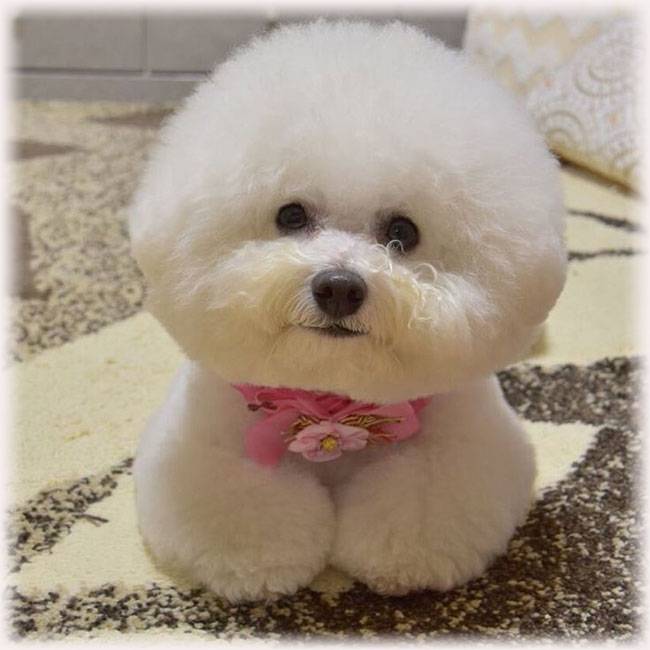
The Bichon Frize is one of the few breeds whose history goes back about two millennia! True, the name of this breed was different. Small white dogs existed in almost all corners of the Mediterranean countries, and in other parts of our planet. Such a vast territory of the dog’s habitat is caused, first of all, by the small size of the animal. During the Renaissance, these dogs lived at the royal court of French monarchs. Quite often, their image is found in portraits along with beautiful ladies of blue blood.
By the end of the 19th century, Bichon Frize began to appear in ordinary families. Increasingly, they appeared on the streets, giving passers-by a lot of positive emotions with their mischievous tricks. Artistic life has become an integral characteristic of Bichon. Also, these four-legged dogs played the role of guides for the blind, and this is another confirmation that these funny dogs are real human companions. In the 20th century, French dog breeders began to breed this breed and gave it their name – Bichon Frize, which literally means “curly coat”.
In 1956, a French family who came from France to the United States brought this breed to the American continent. About 10 years later, the first Bichon Frize fan club was organized in the United States. As a separate breed, the Bichon Frize was recognized by the American Kennel Club only in 1973. According to the American Kennel Club, the breed is currently ranked 73rd in popularity, although back in 2000 it was ranked 25th!
Personality
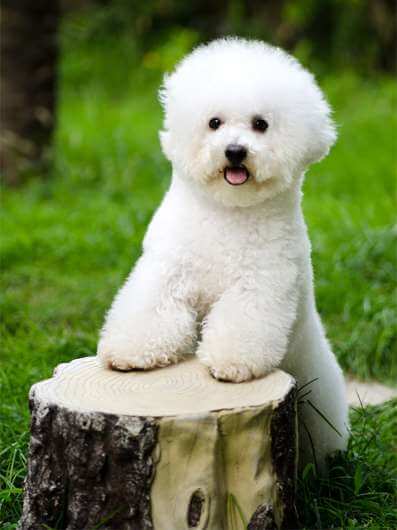
The character of the Bichon Frize is complex. But these are quite obedient dogs, easy to train. They are very active, funny, and playful. Despite their small size, bichons are bold and hardy. They do not like to sit still, are very inquisitive, they will bravely defend the owner from any threat with loud barking. These dogs gained popularity as a pet due to their good-natured disposition and docile behavior. They are not aggressive at all, affectionate, attached to all family members. They are suitable even for inexperienced owners, they easily adapt to any conditions, they take root even in a small apartment. But you should not get bichons for those who are rarely at home. These dogs do not tolerate loneliness, from boredom and longing for the owner they can show destructive behavior, gnaw on things, shoes, furniture.
Bichon Frize is capable of guessing human emotions. Therefore, they are often used for Canis therapy. These dogs visit hospitals, nursing homes, help children with developmental disabilities. They are sociable, trying to amuse a person. They prefer to be among a large number of people. They are especially fond of children, support all the pranks and fun games. Bichon will never hurt a child, even if he accidentally hurts them. These dogs are very peaceful, do not enter into conflicts, and get along with all pets. They are welcoming to strangers, they love guests. But they react adequately to aggression. If something threatens them or their family members, they will bark, they may bite. They will always warn the owners by a voice that someone has come to the door. It is possible to highlight the following character traits of the Bichon Frize, which they inherited from their ancestors:
- energy;
- cheerfulness;
- playfulness;
- sociability;
- curiosity;
- benevolence;
- quick wits;
- obedience;
- devotion.
Description of the Breed
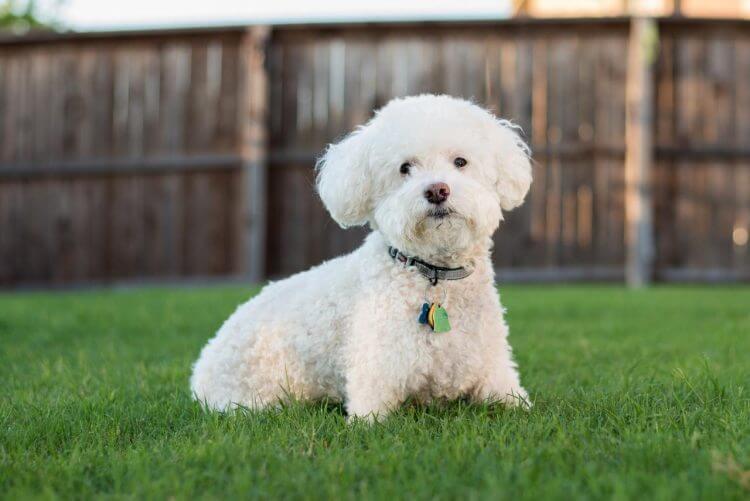
Now the breed standard adopted in 1998 is in force. According to him, the Bichon Frize is referred to as lapdogs. The ICF classification includes them in the group of decorative breeds, companion dogs. They have a recognizable appearance: snow-white curly hair, black smart eyes, compact strong physique. These are small dogs, their height should not exceed 30 cm, and their weight should be 3-5 kg.
The head is proportionally folded, gradually tapering towards the nose. The skull is flat, the transition to the nose is poorly expressed. The nose and rims of the eyes should be black. The eyes are round, large, dark. The lips are thin, also black, the upper one covers the lower one. Scissor bite, sometimes straight. The ears are pendant, triangular in shape, thin. Hanging down to the corners of the lips, covered with long hair.
The neck is long, thin at the base of the skull, widening towards the withers. The body is compact, rectangular. The chest is deep, the back is straight, wide, the stomach is tucked up. The withers are weak, the loin is slightly arched. The tail is set low, half the length of the body. Covered with long hair. The dog does not fold it into a ring when it picks it up, places it parallel to the backline.
The forelimbs are thin, straight, set parallel. The elbows are turned back, the shoulders are not protruding. The hind legs are well-muscled, the thighs are broad. Paws are rounded, toes are collected. The pads are round, black.
Bichon Frize’s coat is long, up to 10 cm, voluminous. It should be soft, curly. Silky to the touch, springy. The undercoat is dense, downy. It is very thick and does not leak water. According to the standard, only white color is allowed. Sometimes puppies will have beige patches, but adult dogs shouldn’t. In France, it is not customary to cut Bichons. Only trimming of hair on paws and muzzle is allowed. But in Russia, the fashion for haircuts of these dogs has spread. Their body hair is shortened, a collar is left, and the head is shaped like a ball.
Disqualifying Vices
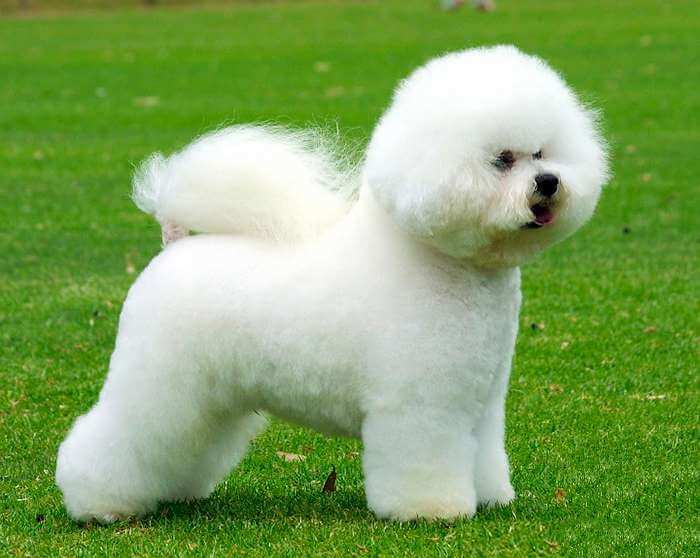
Bichon Frize, which participates in shows and breeding, must meet the exact standard. Do not allow dogs with such disadvantages to them:
- straight or curled wool;
- black, red spots on the coat, cream color;
- malocclusion;
- lack of pigmentation of the nose;
- light eyes;
- tail twisted in a ring.
Education and Training
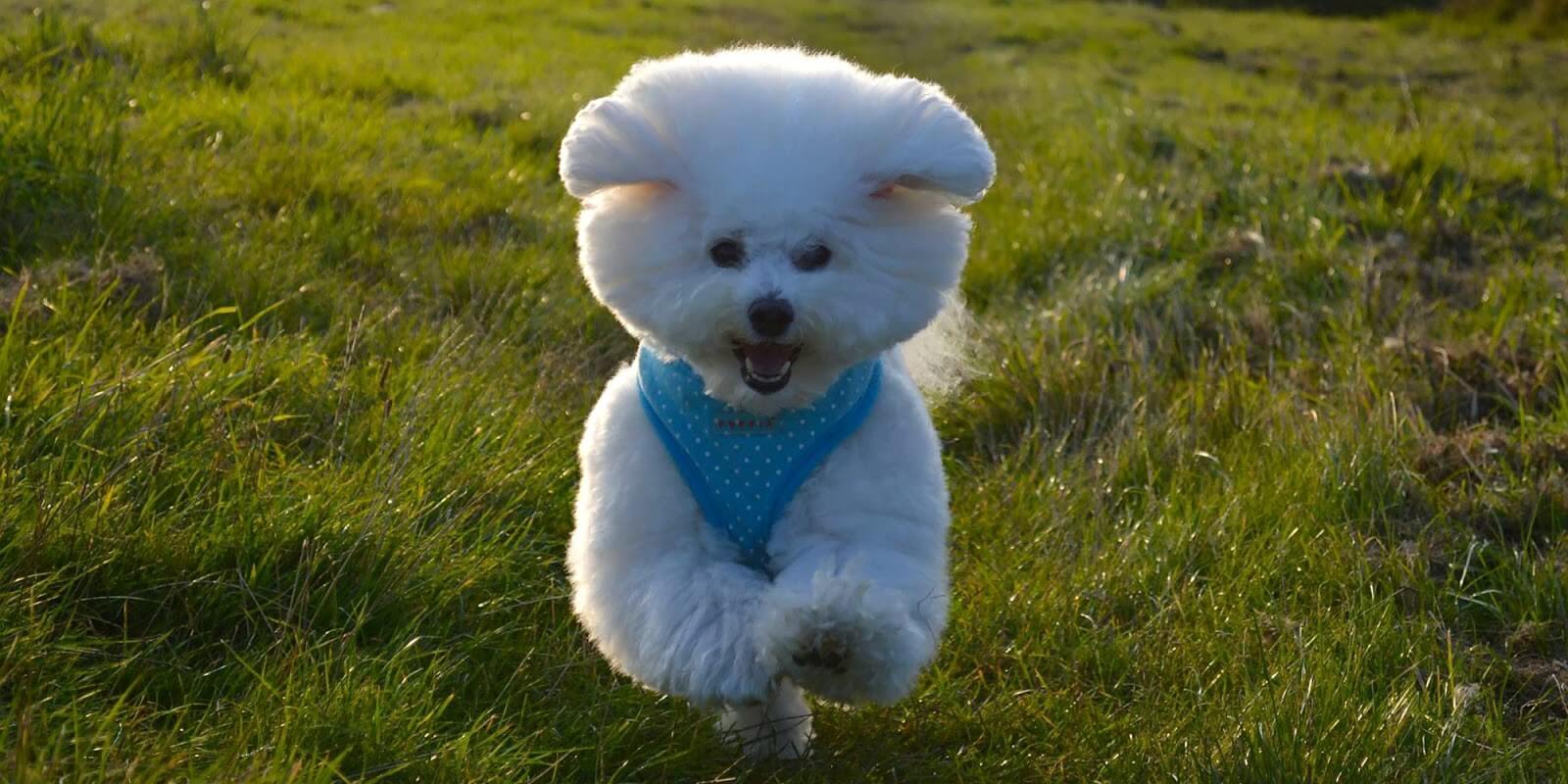
The Bichon Frize dog lends itself well to training. They are very smart pets, they can easily learn even complex commands. Therefore, they often perform in the circus, participate in shows and dog sports. But to teach them something serious, you have to work hard, show patience. These pets have a windy disposition, they cannot concentrate for a long time and quickly lose interest in classes. Another feature of the Bichons is that they do not tolerate rough treatment. You cannot shout, let alone beat a pet. During training, you need to show affection, but be persistent. It is best to use treats as a reward. For disobedience, you can scold in a stern voice.
Decorative dogs may not be trained, but be sure to teach simple commands: “to me”, “place”, “no”, “stand”. It is also necessary to socialize the pet so that it reacts normally to noise from the street, cars, strangers, other dogs. It is necessary to raise a puppy from the first days of its appearance in the house. You need to immediately make it clear that he is not the main one in the house. You should not pamper the baby, allow him liberties. It is necessary to prohibit biting, barking often, gnawing things. All family members must follow the rules of dog behavior in the house. An ill-bred lapdog will become capricious and uncontrollable. But the good thing is that the Bichon Frize is not prone to dominance, they are not touchy.
Care and Maintenance
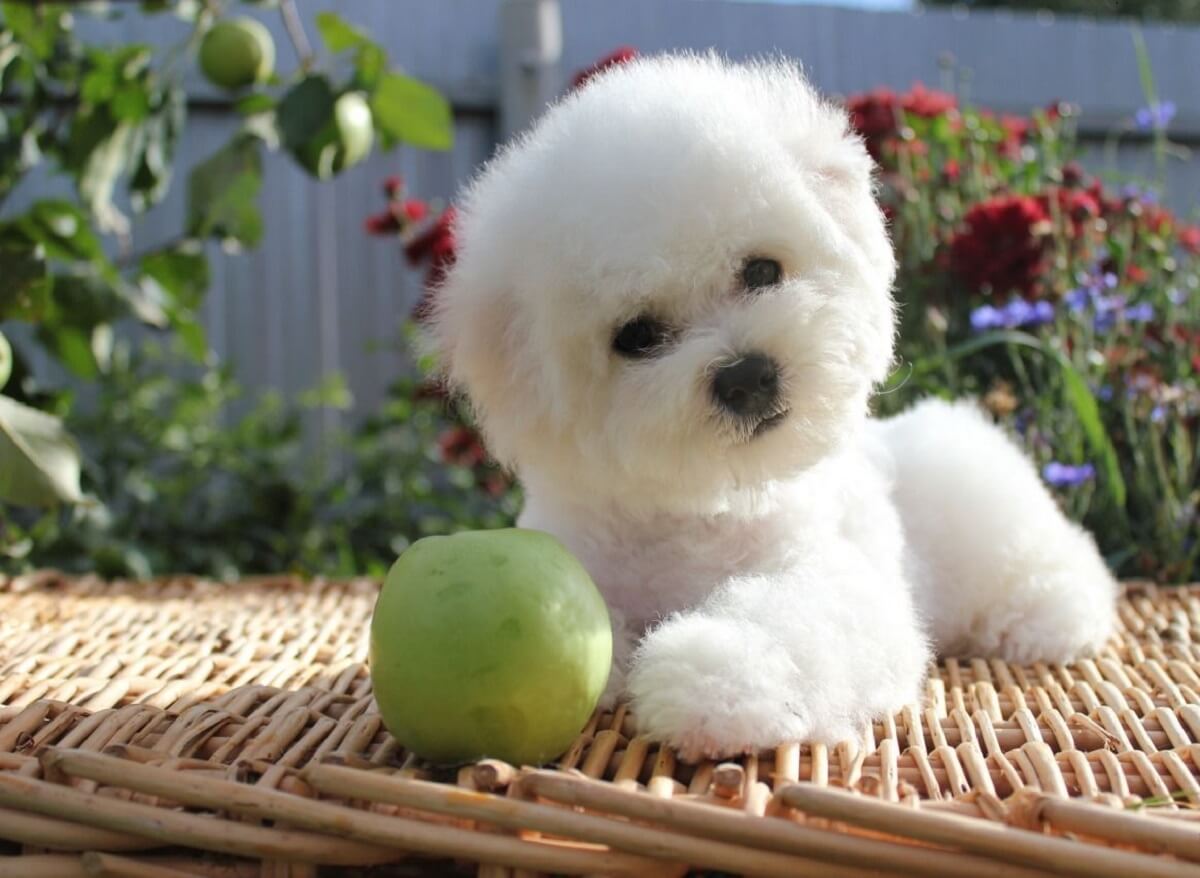
The Bichon Frize is a typical indoor pet. Due to its small size and unpretentiousness, it does not require much space. Your puppy will need a soft bed, bowls for food and water, and some toys. Some dog handlers recommend not forbidding your pet to sleep on the couch or even in bed. This little dog is easy to toilet train with a diaper or litter box, but you still need to walk with it. Bichons are very active, they need to be given the opportunity to run and frolic. The peculiarity of the Bichon Frize is that they practically do not shed. Dogs lose individual hairs all the time, but they do not fall but accumulate in the undercoat. If they are not combed out, mats will form. Therefore, many owners find grooming their wool difficult.
You need to comb it at least twice a week, and better – daily. This is especially important if you are walking on the grass with your pet; it is necessary to remove blades of grass and debris from the wool. To care for a Bichon coat, it is recommended to buy a metal comb and a slicker. The wool of the Bichon Frize is constantly growing, so many owners give them haircuts. It is especially important to trim the hairs on your face so that they do not close your eyes and do not interfere with food intake. The hair is removed between the toes and under the tail. It is not necessary to cut the body, but you can get a beautiful haircut to make your pet look attractive. Show dog owners are advised to contact the grooming salon for this. Otherwise, the care for these dogs is the same as for representatives of other breeds:
- 1-2 times a month to bathe your pet with a completely special shampoo for white wool;
wash your paws after each walk; - in rainy weather and in slush, put on waterproof overalls;
- regularly check and clean the ears, remove hairs if necessary;
- to clean the eyes, the Bichons sometimes have tears that paint the coat reddish or yellowish;
- cut and file nails several times a month, as they rarely grind off on their own;
- To prevent the formation of tartar, brush your teeth with a special paste, and give chewing bones.
Feeding
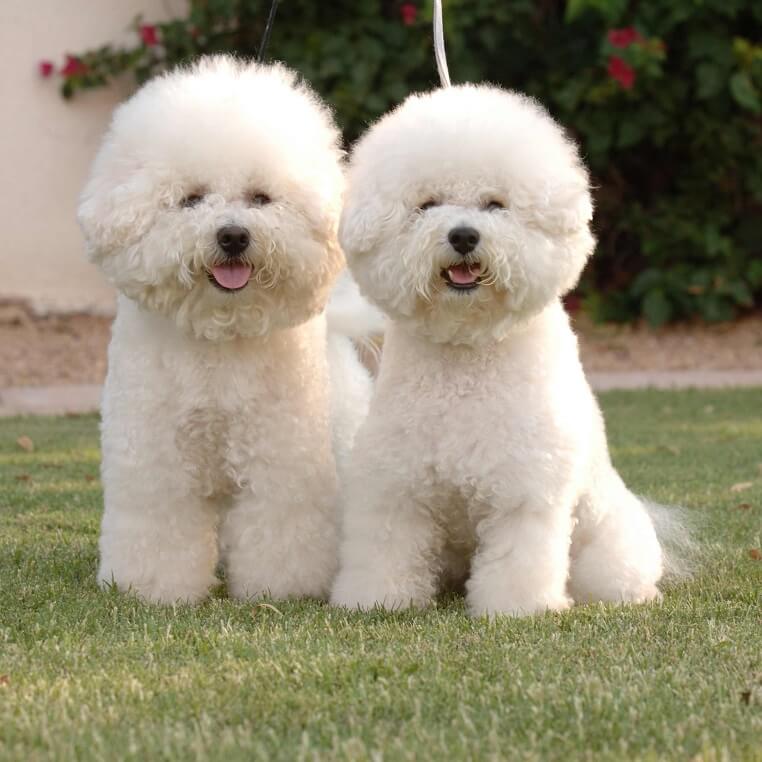
The owner can choose food for the pet: natural food or dry food. But you need to remember that these dogs are prone to allergies and weight gain, they can be capricious in their choice of food. The diet should include the following foods:
- boiled meat, beef is better;
- porridge, except for corn and pearl barley;
- fresh and boiled vegetables;
- boneless sea fish;
- dairy products.
In addition, with natural feeding, give vitamin and mineral complexes, bone meal, fatty acids for wool. Bones, smoked meats, sausages, pastries, sweets are prohibited for dogs. It is not recommended to give carrots, beets, and other foods that can affect the color of the coat. When choosing dry food, give preference to premium and super-premium options. And even better – hypoallergenic, specially designed for dogs with white hair.
Health

The health of these dogs is quite strong, hereditary diseases are rare. It can be:
- dysplasia of the joints;
- allergic dermatitis;
- urolithiasis disease;
- diabetes;
- eye diseases.
This breed is susceptible to vaccinations and often has side effects. But vaccination is necessary to protect against infectious diseases. You also need to regularly treat your pet for parasites.
How to Choose a Puppy
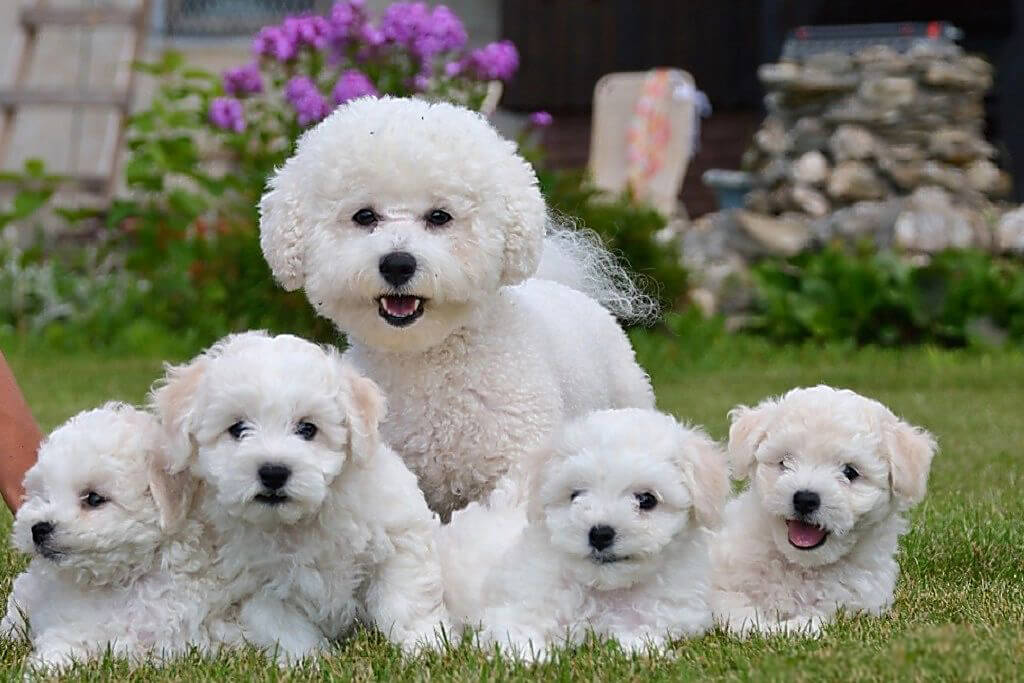
The small number of puppies in the litter, as well as the miniature size of the dog, make it difficult to acquire.
There are a number of nuances when purchasing a puppy:
- Dogs from unrelated and interline breedings may have disqualifying faults and defects. The cost of such puppies is not high, but upon purchase, you will have to sign an agreement on the neutering of the animal in order to prevent further distribution.
- It is impossible to get a purebred puppy of this breed on the market. To do this, you need to contact specialized clubs for breed lovers or a cattery with good recommendations. But even in this case, the chance to acquire a mestizo or a poodle is great. The description of puppies Bichon Frize, Poodle, and Maltese lapdog is practically the same, so the purchase should be accompanied by an independent professional who understands the breed.
- When purchasing a puppy under a contract, you should clarify the possibility of delivery to the desired region from the nursery. Transportation is troublesome, so you need to decide in advance.
- It is better to buy a grown dog for exhibitions, in this case, the chance to get a representative of the breed with defects is less real: it becomes possible to evaluate the color and quality of the coat, to follow the correct change of teeth, and in the case of males, to make sure that the testicles have completely descended.
A careful study of puppies and consultation of specialists will help you not to make a mistake in choosing, and get exactly the one you need.
Regardless of the acquisition goals, it is important to maintain a positive attitude when raising, and not resort to yelling and physical punishment.
Regular gentle grooming and grooming will help maintain your pet’s flawless appearance and health for years to come.






